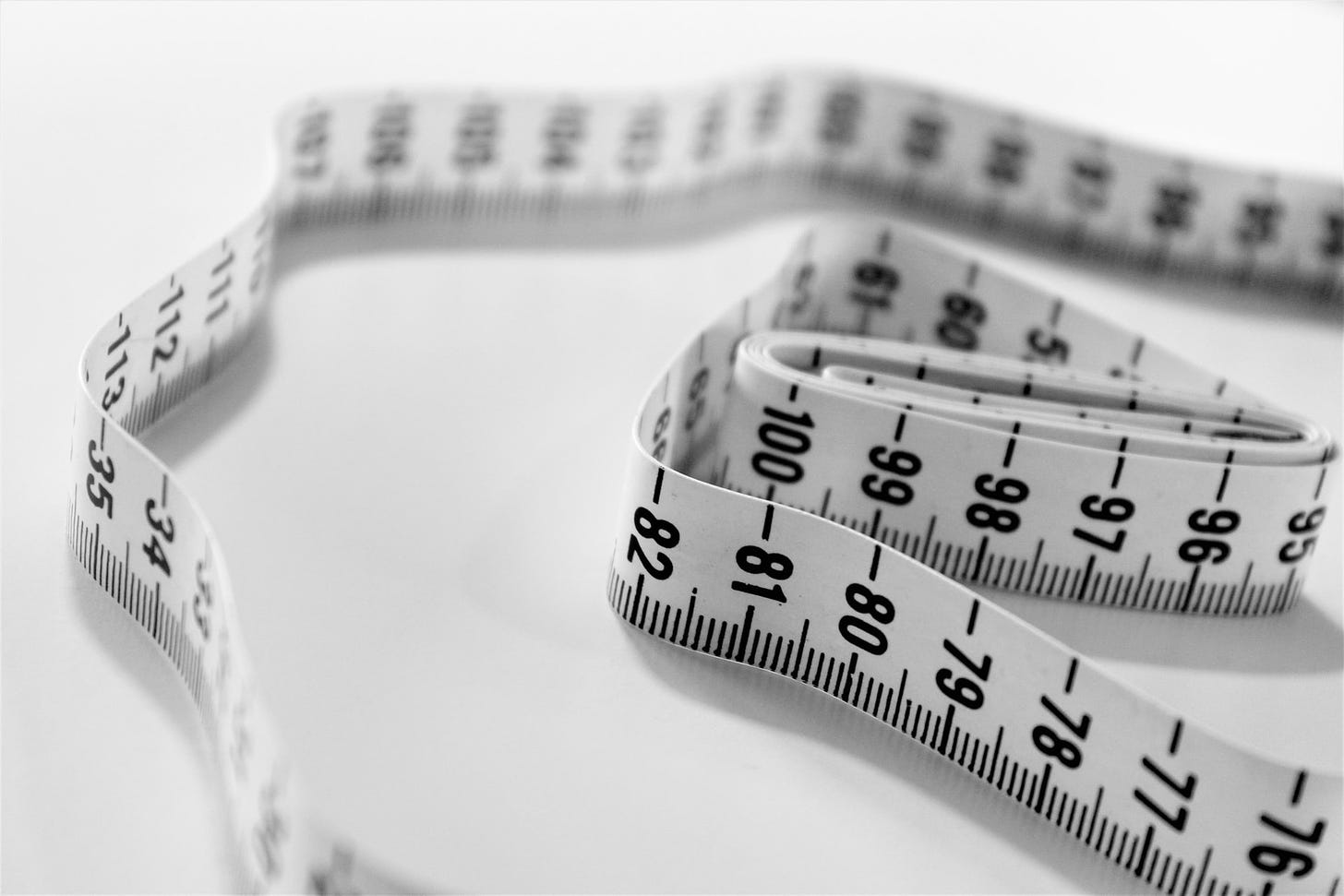But What About Health?
By blaming every health problem on "ob*sity," we do a disservice to everyone’s health.
Welcome to Burnt Toast, a newsletter from Virginia Sole-Smith, which you can read about here. If you like what you read today, please subscribe and/or share it with someone else who would too.
Got a question you’d like me to tackle about how to feed your kids, combat diet culture, and navigate fatphobia (your own and other people’s)? Hit reply and send it over. (Questions are published anonymously and may be edited or condensed to fit the newsletter format.)
Content Warning: Discussion of fatphobia and frequent use of “O-words” in the context of scientific research. Please note that I use “ob*sity” when it’s necessary to reference that word in my own voice, but it’s not my usual practice to edit the word out of other people’s quotes, or in this case, reader questions.
Q: I’m very intrigued by intuitive eating and HAES, and I’m sensitive to anything that makes people feel shame about their bodies. But here’s the issue I keep bumping up against: The CDC, AMA, the Mayo Clinic, and the Harvard School of Public Health all say that obesity is something of a gateway disease, or at least that obesity increases the risk of coronary disease, cancer, diabetes, and maybe even Alzheimer’s. Are they wrong? Are they overstating it? I’ve heard this referred to as “medicalized fatphobia,” which is an intriguing idea, but I’m not ready to throw out the decades of science that point to obesity as a serious health issue. Can you point me in the right direction here? What am I missing?
The thing you’re missing—and that everyone misses, including most of the researchers who work at the CDC, the AMA, the Mayo Clinic and the Harvard School of Public Health—is fatphobia.

Fatphobia, also known as anti-fat bias or anti-fatness, is a pervasive form of stigma in our society. I defined it for kids here, and even if you’re not five, but just new to the concept, it’s a good starting point: A lot of people think and say mean things about fat people. This is called fatphobia and it’s a big problem in our world.
Fatphobia is also not a new problem in the Western world. The ancient Greeks celebrated thin bodies in their sculptures, art and poetry. By the 1500s, corsets made from wood, bone and iron were designed to flatten the torsos of the European aristocracy. And early European novels like Don Quixote and the plays of Shakespeare are full of fat jokes and fat characters played as fools. Many cultures around the world have a history of demonizing fat or equating it with sloth, greed, stupidity, and moral bankruptcy. White-dominated cultures have also long equated it with Blackness, in particular, but also with other people of color, as well as marginalized white immigrant communities. “Obesity seems to occur with greater frequency in the children of immigrants than in those of settled American background,” wrote Hilde Bruch, a Jewish psychologist who studied fatness in Jewish and Italian immigrant children in New York City in 1942. Bruch blamed their mothers; other researchers tied fatness to the alleged biological inferiority of immigrants and communities of color.
It’s also true that prior to the late 19th century, many people (especially poor people) did not live long enough to get fat, or to develop the kind of chronic conditions we use to define “poor health” today. This is where you run into that “fatness used to be celebrated!” argument, because a plump figure, abundant food, and a life of leisure, were all signs of wealth in a society where everybody else had to do hard manual labor in order to not starve. But even back then, an unrealistic and tightly controlled body type (curves, yes, but not too much, and always with a tiny waist) was prized most. Unruly bodies have always been the enemy of a society built on patriarchy and white supremacy.

I know: You wanted me to start listing out research citations and talking disease pathways and here we are in a history lesson. But the history matters because this anti-fat mindset underpins all of modern medicine. As advances in sanitation and science lowered infant mortality and made us less likely to die from infectious diseases (in many places/until 2020), we began to live longer, we began to get chronic diseases like heart disease and cancer in greater numbers, and then—particularly in the past 40 years—more of us began to get fat. But well before this modern “ob*sity epidemic” was underway, we can find clear and shining examples of fatphobia absolutely everywhere in scientific literature on health and longevity. It’s in Quetelet’s formulation of the Body Mass Index as a “measure of the ideal man” in the 1830s. It’s also in the “ideal weight” charts that American life insurance companies used in the early 20th century to determine who paid more for coverage, or was denied it altogether.
So, everything we know about weight and health has been underwritten by our pervasive cultural bias against fat people. You don’t have to throw out all of those decades of research, but it is useful to look critically at how that research got done and consider how useful it can be, given this huge limitation of bias. If you would like a good working example of how anti-fatness influences ob*sity research, I wrote about a really clear one for Scientific Americana few months ago. Fat bias shows up in the questions researchers ask and don’t ask. It shows up in how they frame their findings. It shows up in how the media covers their research. (That particular study that I dissected for SciAm was reported everywhere as “See, you CAN’T be fat and fit!” even though the study didn’t actually show that.) It absolutely shows up in the decision of major medical organizations to classify “obesity” as a disease because that leads us to pathologize body size.
And anti-fatness especially shows up in the fact that any time researchers discover a way that a higher body weight is good for your health—as when it appears to be protective against osteoporosis and certain kinds of cancer, for example—they call it “the ob*sity paradox,” because it’s so startling to see fat people not dying young, like we’re always told they will. “The term ‘obesity paradox’ is a prime example of weight stigma in the scientific literature,” Jeffrey Hunger, an assistant professor of social psychology at Miami University of Ohio told me when I wrote about medical weight stigma for the July 2020 issue of Scientific American. “Think about it: A paradox is something contradictory or seemingly absurd. This term came about because it was considered absurd that fat people could actually be healthy.”
Nevertheless: The fact that the majority of science done on weight and health is conducted by people who hold implicit or explicit biases against fat people doesn’t mean that a high body weight can’t also contribute to disease risk. They can be wrong and right at the same time. But when we try to understand why a high body weight is associated with an increased risk for the conditions you listed, we again run smack into the way that fatphobia narrows this conversation. We don’t know if it’s the high body weight itself that causes certain illnesses, or if weight is only a correlating symptom of some other root cause. We’re only just beginning to understand how social determinants of health—poverty, environmental exposures, experience of chronic oppression, and so on—interact with weight.
We also don’t know the full extent of how fatphobia in healthcare settings worsens the health outcomes for folks in bigger bodies, though that research is starting to pile up. In one survey, 24 percent of physicians admitted they were uncomfortable having friends in larger bodies, and 18 percent said they felt disgusted when treating a patient with a high BMI. You are unlikely to improve the health of someone you find repulsive, and indeed, we see that doctors tend to undertreat, overtreat or even misdiagnose patients in bigger bodies. And fat people are more likely to avoid medical care when they know they’ll be treated badly, which means they are often sicker and harder to treat by the time they do see a doctor. When we accept “ob*sity” as the full answer to any health-related question, we do a disservice to everyone’s health because we aren’t even attempting to understand the infinite nuances of the weight/health relationship.

So now let’s talk about the framing of your question. You’re intrigued by HAES (or Health At Every Size, for those unfamiliar with that acronym) and intuitive eating, and don’t want anyone to feel shame about their body—but you can’t detach from the idea that being fat is unhealthy. I’m curious why these ideas feel mutually exclusive to you? Why does being “unhealthy” mean that a concept like intuitive eating should be off limits? Why should “unhealthy” require some inevitable level of body shame to address? The moral virtue we attach to health is itself very much a product of anti-fat bias (and ableism and our general relentless othering of non-ideal bodies). But if we’re able to recognize fatphobia as a pervasive form of oppression, we should be able to stand against it regardless of whether being fat is bad for your health.
I suspect you’ve connected these ideas because you assume that if a high body weight equals poor health, then the only solution is weight loss. By that logic, it’s understandable to feel like you can’t support HAES or intuitive eating (both of which explicitly advise against intentional weight loss) and still remain pro-health. But that one-size-fits-all approach to healthcare has clearly failed, or we wouldn’t still be talking about the “ob*sity epidemic” or any of these weight-linked health conditions. We don’t have a safe and durable way for the majority of people to lose weight and keep it off. The majority of dieters regain their lost weight (and then some) within 3 to 5 years (see this study, this study, and this one). And even those who do lose weight don’t see the health benefits you’d expect, as this 2013 evidence review lays out.
But more crucially, even if we did have a way to achieve permanent weight loss, it would never be appropriate for every patient, every time. And that’s because health is not a single issue voter. The weight loss that appears (in the short-term, anyway, again, jury very much out on this) to stabilize blood sugar levels might also take a huge toll on someone’s mental health because it triggers obsessive thoughts around food and exercise. Do we sacrifice mental health for better bloodwork and a smaller body? The forever answer in modern healthcare has been yes. But that answer is not really about the lab results, and it’s not even really about health. It’s about fatphobia; that thing we’re always missing, but maybe, are finally starting to see.
Also
Down with Cheetos shaming: As long as other writers continue to stigmatize absolutely normal coping strategies like comfort eating, I’ll keep writing about how your body is not the problem. In my latest for InStyle—on shopping and getting dressed in a post-pandemic world—I point out it’s completely normal to feel weird about dressing for others again, regardless of your body shape or size. Read the whole thing here.
School’s in session: Next Wednesday, June 2, I’ll be giving a virtual talk at Foote School on “The Pandemic, Diet Culture and Our Kids.” Anyone can attend, just RSVP here to get the Zoom link.
You’re reading Burnt Toast, a newsletter by Virginia Sole-Smith. Virginia is a feminist writer, and author of The Eating Instinct and the forthcoming Fat Kid Phobia. Comments? Questions? Email Virginia.
If a friend forwarded this to you and you want to subscribe, sign up here:




I have struggled with this my entire adult life. Both of my parents died in their 50s from diseases commonly associated with weight/eating (Diabetes and Colon Cancer). I am absolutely terrified of leaving my daughter motherless, and afraid of the dire warnings I typically get from my PCP around weight and "predisposition" to disease. But I also think that my mom's colon cancer diagnosis was delayed by nearly a year because her doctor dismissed her symptoms and nagged her, yet again, to eat better and lose weight. Your work has been chipping away at decades of anxiety and my own fatphobia that has kept me tangled in dieting and compulsive exercise. Thank you for helping me to think critically about this issue.
This connected so many dots in my head around the moral virtue of health and its relationship to fatphobia. Society makes moral judgments about things like smoking, substance abuse and, yes, being overweight and then feel like people choose their own consequences. I'm going to need to read this over and over.